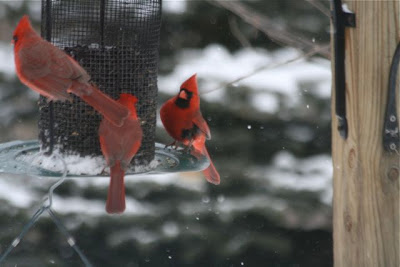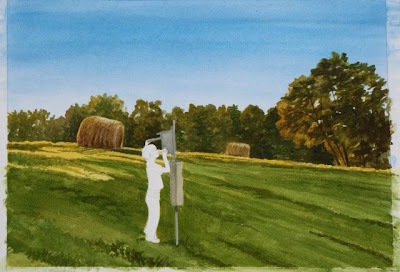
Photo by
Tim Ryan, whose skill is undeniable, whether it's a real camera or one in a phone.
Writing from Woodward, Oklahoma, home of the second annual Lesser Prairie-chicken Festival, where my arrival with
T. R. Ryan and
Debby Kaspari coincided with curtains of nonstop frog-drowning rain and steadily falling temperatures. We repaired to the local Wal-mart, where you can git anything you want, from matching green rubber boots to ponchos to extra pullovers to Tickle Me Elmo flannel jammie pants to thick socks to thermal underwear to strange rubber turkeys that were in the hat section and had slits in the bottom but were probably not hats after all. We bought all of that and more because the roads are all washed out and we'll have to walk to try to see lesser prairie-chickens if we're going to see them at all. And yes, we're having a blast anyway.
Mini-update: The storm system sagged south of us, the skies cleared, we never got rained on, and I now have seen sparring lesser prairie-chickens on the lek. My Swarovski binoculars have one broken eyepiece so they're now monoculars. Must've been a fluke, because they only fell about two feet! No worries--I have my lovely Swarovski scope and all I have to do is send the binocs to the factory when I get home and they'll fix them for free.

I've gotten all my thank-you notes written, to all of you who helped me through the bat episode and helped fund my rabies pre-exposure inoculations. My mama taught me how to write 'em, and she also taught me how to hoard pretty little cards for the time when you'll need them. I've gone through quite a few pretty little notecards, the ones that bad bad Charlie didn't chew to smithereens. I've had the pleasure of corresponding with a bunch of readers who might otherwise have remained unknown to me. It's been really cool. You are an amazing bunch of people and I feel deeply blessed to share a connection with you.
As a Pretend Scientist, I'm incredibly flattered when Real Scientists read my blog and write to say so. I got an email today from one such person, a fabulous woman who sent me my first game camera, telling a story of coincidence that I thought you'd enjoy. I'm excerpting, but the gist is there:
(Our college) had spring break about when you started posting about your bats. We had a class (studying) in Belize (but) I didn't get to go along this year. When the class came back, one of the students told her dad the story about the bat that flew into their room one night. He subsequently called the Center for Disease Control who then called our county health department who then called the student health center...and the result was that 3 of 7 people who were under the roof where the bat had been (none of these people ever touched the bat) went to the emergency room and had post-exposure shots - about $2000 each. I became involved because I am our resident disease ecologist and I was asked to provide our administrators with information on rabies (hopefully in Belize).
Your posts and the link to the USGS publication were incredibly helpful. I also consulted a friend of mine who is an excellent bat biologist. What eventually happened was the health department kept calling the students and faculty who decided against the shots (even though they did not know that no one touched the bat) - these students held firm and decided not to get the shots. The whole thing was really scary...I didn't want to give them the wrong advice, but I also felt that the risk was nearly zero! So all of this rambling to say, thanks for your thoughtful posts on the bat adventures. They were extremely timely and helpful. The USGS document even included data from Belize!The document she's referring to is "Bat Rabies and Other Lyssavirus Infections" by Denny Constantine. It's available for free,
here. Thanks again to Timothy Winship for the link and the information. The ripples of outreach spread outward, ever outward. And nothing is for naught.
Nine-hundred and fifty Girl Scouts were put through post-exposure rabies vaccinations after bats were found roosting in their cabins at a retreat. Does having a bat in the same room really equate to a rabies exposure? You can't be too careful, or can you?
Makes you wonder how we all survived our childhoods.
Bill of the Birds returned from Guyana, having slept in a cabin for two nights with the gentle patter of bat urine and turds raining on his mosquito netting, to the mini-drama unfolding in his own home. I slept in the same cabins two years ago. Well, I tossed and turned there. I wouldn't call it sleeping.
One person in the U.S. has died of the big brown bat rabies strain since 1958. There are indications that this strain may not be as infective or virulent to humans as others. Rabies is not transmitted by magic. You really need bat saliva containing the virus in a bite or scratch wound (which can be microscopic) or on a mucous membrane to constitute an exposure. The stories and studies alleging possible aerosol transmission of rabies in bat caves are questionable. Two spelunkers who contracted the disease in Frio Cave, Texas were wading in knee-deep guano while being collided with by clouds of bats--does that sound like aerosol transmission to you? Sounds like they got bitten or scratched to me. A horrid experiment in which opossums were caged in a teeming bat cave for several weeks resulted in several of the animals contracting rabies. Thanks to the cage wire, they couldn't make direct contact with the bats, but bat urine and effluent rained down on them, as well as live bat lice...well, hmmm. Could they have been bitten by lice that had just bitten a rabid bat? Well, yeah, you'd think so. Again--doesn't sound like aerosol transmission to me. Nor does it sound like magic. People should stay out of bat caves unless they're vaccinated
and have a darn good non-recreational reason to be there, like to study and help the bats.
Research is ongoing, trying to focus down on the incubation period of rabies in bats. It appears to be rather short--generally a couple of weeks from infection to the appearance of symptoms-- and the course of the disease is quick, too. A rabid bat is dead within a week. How I wish rabies weren't in the picture where bats are concerned. Bats have more than enough bad press via folklore, and now face the most devastating epizootic perhaps in history--white nose disease--which is killing them by the hundreds of thousands in the Northeast. Bats are not out to get us. Bats are just trying to live their lives, and they desperately need friends. Now, I feel safe in being one of those friends, having finished my series of three prophylactic (pre-exposure) vaccinations. And I thank you for helping me do that.

On the evening of Sunday, April 4, Bill and I saw the first big brown bat of the season, flittering about our birding towertop. It was a fine sight. I immediately wished for a huge bat house all along the south face of the tower, wished for it to be filled with bats. I took that as a sign that my enthusiasm for bats has been tempered but not extinguished, not by a long shot. I am sadder but, thanks to my friends, much wiser.
Dee Dee is still at the
Ohio Wildlife Center, where she is getting flight conditioning. She broke the straw-fine bones of her fingertips when she beat them against the glass of her super-deluxe tank. I didn't realize it had happened until I saw her swollen fingertips, and even then I didn't realize that she'd broken them.

I had hung two towels along the side for roosting, but didn't know that it's necessary to pad the glass with nonskid foam drawer liner as well, because Dee liked to crawl between the towel and the glass and that's where she did the damage to her wingtips. Now I know that. Here's how they looked soon after the injury:

You can see the bent fingertip in the lower left corner of the photo.

When I saw the swelling in her fingertips I searched online for "swollen finger bones captive bats" and got a web site that advised that Dee Dee might have a bacterial infection treatable with Clavimox. So I got some Clavimox from a friend who is a veterinarian, and gave that to her twice a day. After a week, they seemed a lot better.

When I brought her to
Ohio Wildlife Center, Animal Care Director Lisa Fosco took one look at her and said, "That's not an infection. Those are fractures." She then explained how it must have happened, all for the want of some foam padding which I didn't even know Dee needed. My heart, which had already fallen through my chest when I surrendered Darryl to be tested for rabies, fell even farther. I felt I'd done everything wrong that it was possible to do wrong, all in trying to do something right.
Dee Dee's wingtips curl inward, and her wings look cupped when she flies. Lisa said Dee might still be able to fly well when the tiny bones healed and were no longer sore; she said she's seen a bat with its wingtips missing fly just fine. I got an email last week, and learned that Dee Dee (BigBrownBat #243) is making progress under the expert care of Lisa Fosco and other OWC staff and volunteers. She was flying markedly better than she did when I brought her in two weeks earlier. (They take them into a big room at night and let them fly to see how they're faring. Ooh, can I help?)
As we've seen, rehab stories don't always end well, so I am very cautiously optimistic. I have all my fingers crossed that she'll be able to fly well enough for release. I call upon you, my beloved flying blogmonkeys, to unleash the power of positive thinking and envision Dee Dee rising high and diving nimbly above the gracious old homes of Marietta, Ohio in mid-May, making her way to her maternity roost, Darryl's child safe inside her.

That's Dee in front, hiding under Darryl's leg membrane, in happier days.
























































